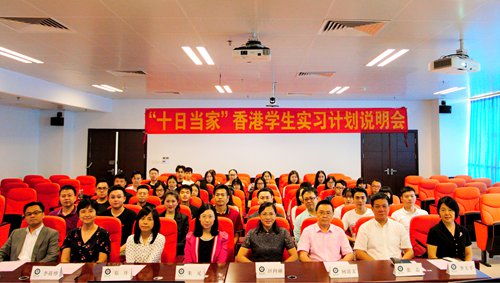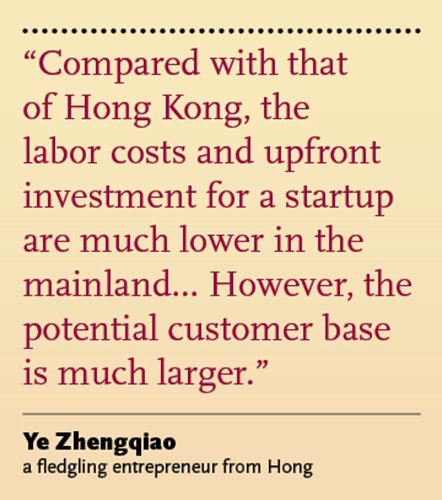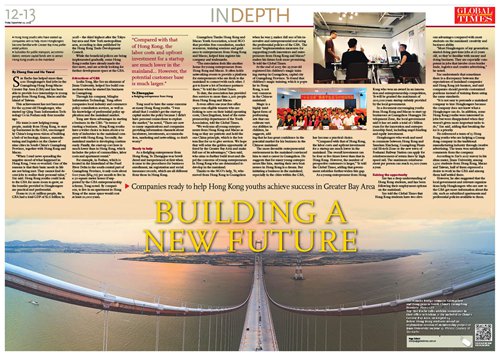HOME >> CHINA
Companies ready to help Hong Kong youths achieve success in Greater Bay Area
By Zhang Dan and Hu Yuwei Source:Global Times Published: 2019/9/19 19:24:55
○ Hong Kong youths who have started up companies aim to help more Hongkongers become familiar with Greater Bay Area preferential polices
○ Subsidies for public transport, accommodation, venture capital funds aim to attract Hong Kong youths to the mainland

This achievement has not been easy for the 23-year-old Hongkonger, who started up Qing Yuan Information Technology Co in Foshan only four months ago.
His team is now helping young people, mainly from Hong Kong, to start up businesses in the GBA, encouraged by China's long-term vision of building a hub of technology, finance, manufacturing and logistics on the cluster of nine cities in South China's Guangdong Province, together with Hong Kong and Macao.
"When I read news spreading the negative mood of what happened in Hong Kong, I was so worried. One of the reasons is that their basic needs in life are not being met. They cannot find decent jobs to realize their personal value," Sze said. Hong Kong youths could look to the GBA for more room to grow, as the benefits provided to Hongkongers are practical and preferential.
Home to 71.16 million people, the GBA had a total GDP of $1.6 trillion in 2018 - the third highest after the Tokyo bay area and New York metropolitan area, according to data published by the Hong Kong Trade Development Council.
While the beneficial polices are being implemented gradually, some Hong Kong youths have already made the first move, and are actively looking for further development space at the GBA.
Attractions of GBA
Leslin Tong, like Sze an alumnus of Jinan University, helped Sze build connections when he started his business in Guangdong.
Through his company, Minghu Information Technology, Tong offers companies local industry and commerce policy consultation services, as well as his knowledge of preferential policy application and the mainland market.
Tong saw three advantages in starting a business in the GBA: "In terms of starting a business, Hong Kong youths have a wider choice to learn about a variety of industries in the mainland compared with Hong Kong. Secondly, the mainland market is developing continuously. Finally, the start-up cost here is much lower than in Hong Kong, which includes the price of commodities, labor costs and apartment rental."

Tong used to have the same concerns as many Hong Kong youths. "I was afraid that I couldn't get the start-up capital under the policy because I didn't have personal connections to explore the market," he noted, "There are now so many organizations and companies providing information channels about incubators, investments, accommodation, marketing and networking, so don't worry."
Ready to help
As a fledgling entrepreneur from Hong Kong, Ye Zhengqiao was bewildered and inexperienced at first when it came to the procedures for business enrollment, tax registration and social insurance records, which are all different from those in Hong Kong.
Guangzhou Tianhe Hong Kong and Macao Youth Association, a local NGO that provides free consultation, market resources, training sessions and guidance to entrepreneurs from Hong Kong and Macao, helped him register his company and trademarks.
"The association feels like another home for young entrepreneurs from Hong Kong and Macao. It often holds networking events to provide a platform for entrepreneurs who are fresh to the mainland to connect with each other. I got to know a lot of business partners there," Ye told the Global Times.
To date, the association has provided free services to more than 2,200 people from Hong Kong and Macao.
It even offers one-year free office space ome eligible tenants who are looking to save on their initial operating costs, Chen Jingzhan, head of the entrepreneurship department of the Youth Association, told the Global Times.
"We welcome all young entrepreneurs from Hong Kong and Macao as long as they are patriotic and hold the one-China principle, which is the bottom line for us to give services. We hope they will seize the golden opportunity offered by the Greater Bay Area and make full use of its advantages," Chen said, who aims to further build trust and dispel the concerns of young entrepreneurs in Hong Kong who are determined to develop in the mainland.

At the end of 2017, the 25-year-old registered his children's magic training startup in Guangzhou, capital city of Guangdong Province. Ye found that children's magic training, which is popular in Hong Kong, is not very common in the Chinese mainland.
Magic is a highly intelligent form of performing arts that can cultivate various abilities in children, he suggests, adding that he has great confidence in the potential market for his business in the Chinese mainland.
The more favorable entrepreneurial environment in the mainland convinced him to start a career in Guangzhou. He suggests that for many young entrepreneurs like him, starting their own businesses in Hong Kong is a dream. But initiating a business in the mainland, especially in the cities within the GBA, has become a practical choice.
"Compared with that of Hong Kong, the labor costs and upfront investment for a startup are much lower in the mainland. The overall investment can be four or five times lower than that in Hong Kong. However, the number of prospective customers is larger," Ye told the Global Times, adding that government subsidies further widen this gap.
As a young entrepreneur from Hong Kong who won an award in an innovation and entrepreneurship competition, Ye will be granted the maximum of 200,000 yuan startup subsidy provided by the local government.
In a document encouraging youths from Hong Kong and Macao to start up businesses at Guangzhou Huangpu Development Zone, the local government said it has set aside a total of 1 billion yuan for the innovation and entrepreneurship fund, including angel funding and equity investment.
Hongkongers who work and need to commute between Hong Kong and Sanshan Xincheng, Guangdong Financial Hi-tech Zone or the new town of Foshanxi Railway Station can apply for reimbursement of return fares by high speed rail. The maximum reimbursement per person can reach 10,000 yuan a year.
Seizing the opportunity
Sze has a deep understanding of Hong Kong students, and has been following their employment options on the mainland.
Sze told the Global Times that Hong Kong students have two obvious advantages compared with most students on the mainland: creativity and business ability.
"Most Hongkongers of my generation started doing part-time jobs at 16 years old, so they're familiar with money and doing business. They are especially competent in jobs that involve cross-border trade, logistics and creative advertising," he noted.

"It is not easy to persuade a mainland company to hire Hongkongers because the company does not know what a Hongkonger can do. In addition, some Hong Kong youths were interested in jobs but were disappointed when they weren't given more important tasks to do," Sze said, adding that breaking the ice is a priority.
He referenced a team of 13 Hong Kong youths who are helping a Guangdong company in the traditional manufacturing industry through creative advertising. The team won satisfactory comments from the company.
According to Sze's 2017 survey in his alma mater, Jinan University, among 1,300 students from Hong Kong, Macao and Taiwan, half of them expressed a desire to work in the GBA and among them half settled there.
However, he also suggested that the local government and relevant organizations help Hongkongers who are new to the GBA get more information about the city, such as subsidized apartments and preferential policies available to them.

Newspaper headline: Building a new future
○ Subsidies for public transport, accommodation, venture capital funds aim to attract Hong Kong youths to the mainland

The Nansha Bridge connects Guangzhou and Dongguan in South China's Guangdong Province. Photo: CFP
Sze Kacho has helped more than 200 Hongkongers find jobs in the Guangdong-Hong Kong-Macao Greater Bay Area (GBA) and has been able to provide 600 internships to young people from Hong Kong, Macao and the island of Taiwan.This achievement has not been easy for the 23-year-old Hongkonger, who started up Qing Yuan Information Technology Co in Foshan only four months ago.
His team is now helping young people, mainly from Hong Kong, to start up businesses in the GBA, encouraged by China's long-term vision of building a hub of technology, finance, manufacturing and logistics on the cluster of nine cities in South China's Guangdong Province, together with Hong Kong and Macao.
"When I read news spreading the negative mood of what happened in Hong Kong, I was so worried. One of the reasons is that their basic needs in life are not being met. They cannot find decent jobs to realize their personal value," Sze said. Hong Kong youths could look to the GBA for more room to grow, as the benefits provided to Hongkongers are practical and preferential.
Home to 71.16 million people, the GBA had a total GDP of $1.6 trillion in 2018 - the third highest after the Tokyo bay area and New York metropolitan area, according to data published by the Hong Kong Trade Development Council.
While the beneficial polices are being implemented gradually, some Hong Kong youths have already made the first move, and are actively looking for further development space at the GBA.
Attractions of GBA
Leslin Tong, like Sze an alumnus of Jinan University, helped Sze build connections when he started his business in Guangdong.
Through his company, Minghu Information Technology, Tong offers companies local industry and commerce policy consultation services, as well as his knowledge of preferential policy application and the mainland market.
Tong saw three advantages in starting a business in the GBA: "In terms of starting a business, Hong Kong youths have a wider choice to learn about a variety of industries in the mainland compared with Hong Kong. Secondly, the mainland market is developing continuously. Finally, the start-up cost here is much lower than in Hong Kong, which includes the price of commodities, labor costs and apartment rental."

Sze Kacho talks with his teammates in their office at Foshan, a city included in China's Greater Bay Area, on August 14. Photos: Courtesy of Sze Kacho
For example, in Foshan, which is located in the hinterland of the Pearl River Delta in the south-central part of Guangdong Province, it only costs about 600 yuan ($84.70) per month to live in a 50-square meter house if supported by the GBA entrepreneurship scheme, Tong noted. By comparison, to live in an apartment in Hong Kong of the same space would cost at least 10,000 yuan.Tong used to have the same concerns as many Hong Kong youths. "I was afraid that I couldn't get the start-up capital under the policy because I didn't have personal connections to explore the market," he noted, "There are now so many organizations and companies providing information channels about incubators, investments, accommodation, marketing and networking, so don't worry."
Ready to help
As a fledgling entrepreneur from Hong Kong, Ye Zhengqiao was bewildered and inexperienced at first when it came to the procedures for business enrollment, tax registration and social insurance records, which are all different from those in Hong Kong.
Guangzhou Tianhe Hong Kong and Macao Youth Association, a local NGO that provides free consultation, market resources, training sessions and guidance to entrepreneurs from Hong Kong and Macao, helped him register his company and trademarks.
"The association feels like another home for young entrepreneurs from Hong Kong and Macao. It often holds networking events to provide a platform for entrepreneurs who are fresh to the mainland to connect with each other. I got to know a lot of business partners there," Ye told the Global Times.
To date, the association has provided free services to more than 2,200 people from Hong Kong and Macao.
It even offers one-year free office space ome eligible tenants who are looking to save on their initial operating costs, Chen Jingzhan, head of the entrepreneurship department of the Youth Association, told the Global Times.
"We welcome all young entrepreneurs from Hong Kong and Macao as long as they are patriotic and hold the one-China principle, which is the bottom line for us to give services. We hope they will seize the golden opportunity offered by the Greater Bay Area and make full use of its advantages," Chen said, who aims to further build trust and dispel the concerns of young entrepreneurs in Hong Kong who are determined to develop in the mainland.

Hong Kong students attend an explanation session of an internship project at Jinan University on June 13. Photos: Courtesy of Sze Kacho
Thanks to the NGO's help, Ye, who moved from Hong Kong to Guangzhou when he was 7, makes full use of his innovative and entrepreneurial zeal using the preferential policies of the GBA. The recent "implementation measures for supporting youth innovators and entrepreneurs from Hong Kong and Macao" makes his future look more promising, Ye told the Global Times.At the end of 2017, the 25-year-old registered his children's magic training startup in Guangzhou, capital city of Guangdong Province. Ye found that children's magic training, which is popular in Hong Kong, is not very common in the Chinese mainland.
Magic is a highly intelligent form of performing arts that can cultivate various abilities in children, he suggests, adding that he has great confidence in the potential market for his business in the Chinese mainland.
The more favorable entrepreneurial environment in the mainland convinced him to start a career in Guangzhou. He suggests that for many young entrepreneurs like him, starting their own businesses in Hong Kong is a dream. But initiating a business in the mainland, especially in the cities within the GBA, has become a practical choice.
"Compared with that of Hong Kong, the labor costs and upfront investment for a startup are much lower in the mainland. The overall investment can be four or five times lower than that in Hong Kong. However, the number of prospective customers is larger," Ye told the Global Times, adding that government subsidies further widen this gap.
As a young entrepreneur from Hong Kong who won an award in an innovation and entrepreneurship competition, Ye will be granted the maximum of 200,000 yuan startup subsidy provided by the local government.
In a document encouraging youths from Hong Kong and Macao to start up businesses at Guangzhou Huangpu Development Zone, the local government said it has set aside a total of 1 billion yuan for the innovation and entrepreneurship fund, including angel funding and equity investment.
Hongkongers who work and need to commute between Hong Kong and Sanshan Xincheng, Guangdong Financial Hi-tech Zone or the new town of Foshanxi Railway Station can apply for reimbursement of return fares by high speed rail. The maximum reimbursement per person can reach 10,000 yuan a year.
Seizing the opportunity
Sze has a deep understanding of Hong Kong students, and has been following their employment options on the mainland.
Sze told the Global Times that Hong Kong students have two obvious advantages compared with most students on the mainland: creativity and business ability.
"Most Hongkongers of my generation started doing part-time jobs at 16 years old, so they're familiar with money and doing business. They are especially competent in jobs that involve cross-border trade, logistics and creative advertising," he noted.

Sze understands that sometimes there is a discrepancy between the expectations of mainland companies and Hong Kong job hunters, and said companies should provide customized positions instead of training them using the same standards.
"It is not easy to persuade a mainland company to hire Hongkongers because the company does not know what a Hongkonger can do. In addition, some Hong Kong youths were interested in jobs but were disappointed when they weren't given more important tasks to do," Sze said, adding that breaking the ice is a priority.
He referenced a team of 13 Hong Kong youths who are helping a Guangdong company in the traditional manufacturing industry through creative advertising. The team won satisfactory comments from the company.
According to Sze's 2017 survey in his alma mater, Jinan University, among 1,300 students from Hong Kong, Macao and Taiwan, half of them expressed a desire to work in the GBA and among them half settled there.
However, he also suggested that the local government and relevant organizations help Hongkongers who are new to the GBA get more information about the city, such as subsidized apartments and preferential policies available to them.

Newspaper headline: Building a new future
RELATED ARTICLES: